| Madrid, august,
16th 2004 - While overlooking the Alps mountains, I was savouring
a Swiss raclette and talking with the President
of the Czech Republic, Vaclav Klaus, moments after having
exchanged a
few words with the Vice President of Iraq, Mr. Rowsch Shaways
about democracy and the security situation in his country.
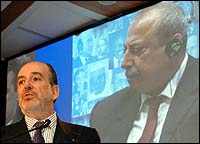
Jean-Paul Carteron, speaking to delegates
of the Crans Montana Forum.
|
There are few events in the world where a person can network
and meet so many foreign leaders and dignitaries. The Crans
Montana Forum is one of them – an event where the political
and business elite discuss key regional and global issues
in the hope of building a “more humane world”.
The question is: can an event like the Crans Montana Forum
really propel change? Can it really affect long-term government
policies and build consensus on divisive issues?
In a small way, perhaps it did. This year’s forum,
which took place from June 24th to 27th in the Swiss mountain
resort of Crans Montana, focused on the development of the
Middle east, Eastern Europe and Africa. Discussions were
varied, dealing with a range of issues such as security,
democracy, regional integration, international trade, agricultural
development and the role of multinational corporations to
contribute to sustainable development.
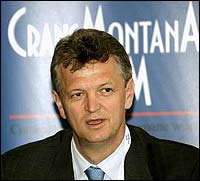
Minister Zuzul speaking at the Crans Montana
Forum. |
The conference attempted to go beyond the sound bites of
a typical news story on CNN – it tried to go beyond
the surface and into the heart of the matter. In this way,
through honest and open dialogue, the Crans Montana Forum
was opening the door to meaningful discussion and open debate.
For example, the discussion on european
integration was
heated, as Rauf
Denktash (64KB PDF), President of the Turkish
Republic of Norther Cyprus, voiced his disappointment about
the recent
referendum on EU accession, while Alfred Moisiu, President
of Albania, suggested that the European Union was not doing
enough to help Albanians improve their economy.
Meanwhile, there were some EU enlargement success stories,
such as the approval of Croatia last month to join the European
Union, which was hailed as an example to other Balkan countries.
“Croatia is providing the model for
other countries in the region, by implementing international
standards and
achieving concrete results. This is the message we are sending:
if Croatia can do it, we can all do it” said Dr.
Miomir Žužul ( Read
our Interview ),
the Croatian Minister of Foreign Affairs.
In the Middle East, globalisation is an issue which touches
all Arab countries as they attempt to modernise their economies
while preserving their culture.
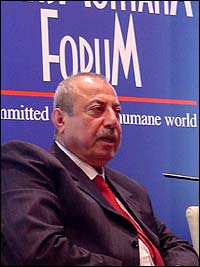
Rowsch Shaways, Vice President of Iraq. |
“Our children are living a 21st century life during
the day with access to the Internet, mobile phones and new
shopping malls, yet they are coming home at night to a family
life that still maintains 19th century practices…” said
Muin Khoury, Director of Research in the Royal Hashemite
Court of Jordan. Delegates agreed that both culture and globalisation
are not exclusive; they can both co-exist and grow together.
“Globalisation is no longer a choice,
it is a reality. The challenge now is to adapt and adopt
appropriate measures
to benefit from its fruits and mitigate its negative consequences” added
Abdel
Aziz Abu Hamad Aluwaisheg (65KB PDF), Director for Economic
Integration of the Gulf Cooperation Council.
Meanwhile, the Government of Iraq was on the defensive,
attempting to assure the international community that they
would restore order and security to the nation, even if it
would take time. When asked if democracy was really attainable
within the next six months, Vice President Shaways tried
to be optimistic and promised that this would be one of the
three major goals of his administration: democracy, security
and economic reform.
Even though the situation in Iraq seems to change every
day, “optimism is the only option” professed
Shaways.
This set the tone for the intervention of
His
Majesty Reza Pahlavi, the son of the Shah of Iran, who
stated that “a pluralist and democratic Iraq, next door
to Iran, will facilitate the development of true, laic democracy
in the region in which we can embrace religious freedom”.
Pahlavi believes that Iran may soon go through a political
transformation similar to the one in South Africa or Czech
Republic.
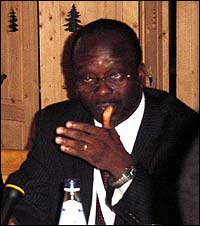
Madikaba Camara, Ministre de l'economie de
Guinee. |
“The regime is more and more isolated, and is attempting
to re-enforce its authority by repressing the wishes of its
people. We need the freedom to choose our system of government” concludes
Pahlavi.
Along with the concern for the situation in the middle east,
Africa was on the agenda as well, particularly due to the
explosive situation in Ivory Coast which is being torn into
northern and southern ethnic camps and fuelled by religious
tensions.
The future of Western Africa was a major issue for discussion.
While the region seeks trade harmonization it is also experiencing
major difficulties to diversify its economy and re-distribute
wealth to its people. Yet the delegation of Guinée
was optimistic. Led by the Minister of Economy, Mr. Madikaba
Camara, and the Minister of Mines, Mr. Alpha Mady Soumah,
the government of Guinée hopes to take a leading role
in the region, announcing that it will host a Western African
Summit in the capital city of Conakry next year.
“Increased security, economic diversification, foreign
investment partnerships and the reduction of poverty are
essential goals for the prosperity of West Africa” stated
Madikaba Camara, Minister of Economy and Finance of Guinée.
It is with this image in mind
that Jean-Paul
Carteron (370KB PDF), Chairman and Founder of the Crans
Montana Forum and Monaco World Summit,
agreed that “the world is loosing its focus and
direction, due to increased poverty and exclusion”.
Through dialogue and understanding, it is his hope that we
can improve the
state of the world and find a balance between peace, development
and corporate responsibility.
In a small way, the Crans Montana Forum might have contributed
to this goal. Will it change the world? Probably not. Yet
the dialogue and the contacts that it has generated could
be the starting point for change. By opening our eyes to
different ideas and different viewpoints, while putting pressure
on public opinion and lobbying government officials, the
Crans Montana Forum will have been able to drive the impetus
for change.
Although this is only a first step, it is certainly a step
in the right direction.
 Following the Crans Montana Forum, the MONACO WORLD SUMMIT,
an exclusive event which brings together representatives
from government and the private sector, will be organised
in association with the World Tourism Organisation and will
take place in Monaco on October 27th to 29th, 2004. Following the Crans Montana Forum, the MONACO WORLD SUMMIT,
an exclusive event which brings together representatives
from government and the private sector, will be organised
in association with the World Tourism Organisation and will
take place in Monaco on October 27th to 29th, 2004.
For more information please visit www.cmf.ch or contact
the conference organisers at:
Crans Montana Forum / Monaco World Summit
41, Av. Hector Otto - Le Patio Palace - 98000 Monaco
Tel.: 00377 9770 7000 - Fax: 00377 9770 7040
summit@world-summit.org
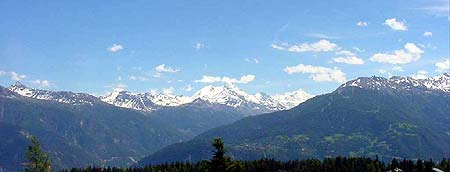
Crans Montana SkyLine.
|

